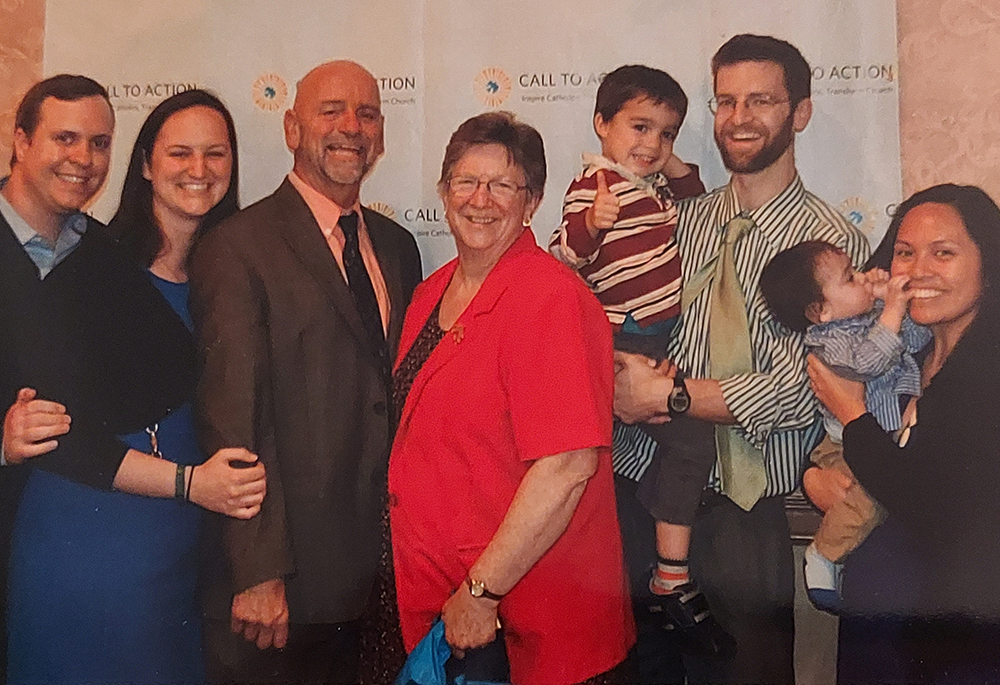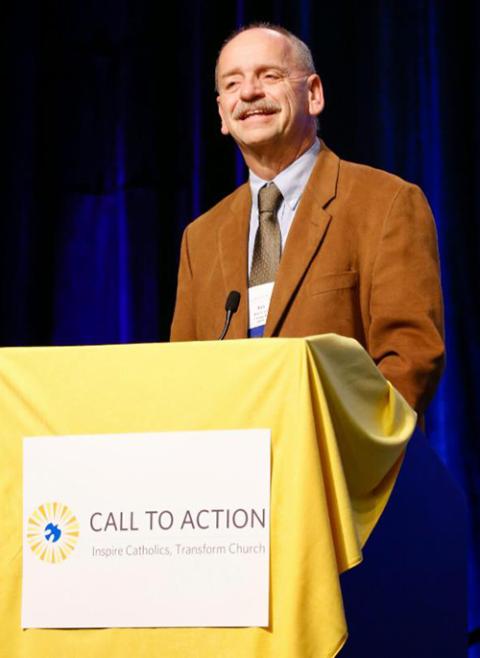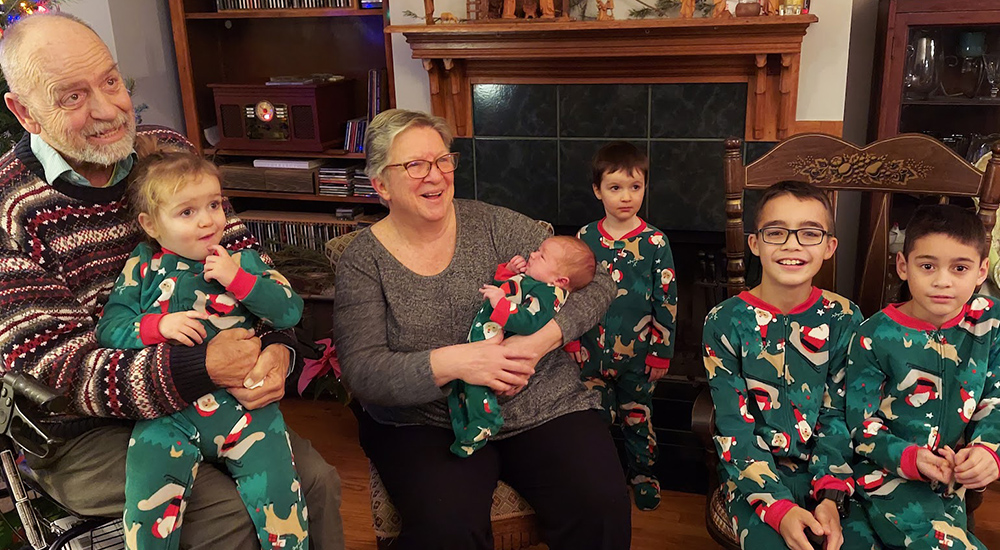
Robert Heineman, third from the left, is pictured with his family at his Call to Action retirement party. Heineman died Dec. 13. (Courtesy of Eileen Heineman)
Robert Heineman used to tell his friends and colleagues from the progressive Catholic reform group Call to Action that the best way to bond with a donor was to sleep on their couch.
During his nearly 20 years on Call to Action's national staff, from which he led its fundraising efforts, Heineman often traveled the country for weeks at a time, visiting donors and sleeping in their homes rather than staying in expensive hotels.
"Bob was a person who connected with you totally right away," said Pat McSweeney, a Call to Action member in Massachusetts who became friends with Heineman. He stayed in her home a few times during his road trips to the Northeast.
As Call to Action's chapter coordinator, Heineman cultivated deep relationships with scores of like-minded progressive Catholics across the United States. At any given time, Heineman knew who to call to congratulate them for attaining a graduate degree, and which members needed their spirits lifted during challenging times.
"Because of Bob, Call to Action members really felt cared for, and that in turn made everyone feel like they were part of something greater than themselves," said Jim FitzGerald, who served as the organization's executive director from 2009 to 2016.
In interviews with NCR, FitzGerald and other Call to Action leaders and volunteers shared fond memories of Heineman, who died Dec. 13 at his home in Skokie, Illinois. Heineman was 77, and had battled Parkinson's disease for several years, as well as kidney and heart disease. He retired from Call to Action in 2017.

Bob Heineman, at a Call to Action conference in 2014 (Courtesy of Eileen Heineman)
Heineman underwent a quadruple bypass surgery 20 years ago and suffered two heart attacks, but he bounced back. He continued traveling and attending conferences, where he could be seen moving with the aid of a walker loaded with canvas bags filled with paperwork.
"He was pretty resilient," said Eileen Heineman, who told NCR that in the year before he died, her husband of 45 years traveled to Germany and Ireland, vacationed in Hawaii with their daughter's family, and spent 10 days in Florida.
Lauren Barbato, the current executive director of Call to Action, told NCR that the organization is collecting personal testimonials and is planning to honor Heineman in a virtual event later this year. She said many people reached out to her after his death.
"He was right there on the front lines of Call to Action and the church reform movement," Barbato said.
Born in Connersville, Indiana, Heineman grew up in a Catholic household that participated in ecumenical gatherings. As a teenager, Heineman accompanied his parents in attending lectures about the Second Vatican Council, which was held while he attended high school in the early 1960s.
Heineman cultivated a deep appreciation for justice and reform as he graduated from the University of Notre Dame in the early years after Vatican II. As a young adult, he worked as a union organizer, consumer advocate, and college professor.
Eileen Heineman told NCR she met her husband almost a half-century ago when he taught one semester as an adjunct professor at Columbia College Chicago. She mistakenly enrolled in the class thinking that a different professor named Heineman was teaching the course.
After that semester, they dated and later married. They had two children and five grandchildren.

Bob and Eileen Heineman are pictured with their five grandchildren at Christmas 2022. (Courtesy of Eileen Heineman)
Eileen Heineman said her husband maintained a steely-eyed optimism about the possibility of change in the Catholic Church.
"He was not in any way naive about the way in which the church and the world worked," she said. "He knew change was ridiculously difficult to expect, and yet he believed in the possibility of the people of God, the church, to make change."
Eileen Heineman described her husband as "a very early feminist" who had a clear sense of equity for women in all aspects within the Catholic Church. Around 10 years ago, he accompanied an international group of Catholics to Rome to advocate for women's ordination.
"He was strongly committed to women's issues at a time when even some of our supporters weren't quite there yet," said Sheila Daley, a former religious sister who founded Call to Action in 1976 with her husband, Dan, a former priest.
Daley told NCR that Heineman joined Call to Action's national staff in the 1990s when the organization was looking to develop local chapters around the country. She said his background in community organizing, volunteer work with the organization, and interest in church reform made him a good fit.
"I think Bob's first loves were the justice and peace issues," Daley said. "But as we moved into the church issues on a national level, I think he got very passionate about them."
FitzGerald described Heineman as a "visionary" who saw the interconnectedness of all social justice issues.
"He saw how and where our anti-racism work connected with worker justice, how feminist and feminist principles show up in workers' rights and in policies that are coming out of our various church offices around the country," FitzGerald said.
Advertisement
Just as critical as Heineman's vision, experience and dedication to the church reform movement were his outgoing personality and genuine interest in people, said those who knew and worked alongside him for decades.
"Bob had a real gift for people. He could form very positive ties with them," Daley said. "I really think we never would have succeeded in developing as many regions as we did, and whatever success they had, unless we had Bob on board."
"It was part of why I think he enjoyed the chapter work," Eileen Heineman said. "He was always happy to hear about what was going on in local communities to make church possible for people who had no longer any interest in the institution but had very much interest in being the people of God."
FitzGerald said he was "always so amazed" at Heineman's ability to connect with people.
"He had the ability to make you feel welcome immediately, to make you feel like you were meant to be there, and that he was very glad that you were there," FitzGerald said.
One such Call to Action official who benefited from Heineman's support was Zachary Johnson, who succeeded FitzGerald as executive director in 2017 and served in that capacity for five years. Johnson told NCR that mentioning Heineman's name was "a great icebreaker" when meeting people in the Call to Action network.
"Bob was just a great lover of people," Johnson said. "And people loved him too."







